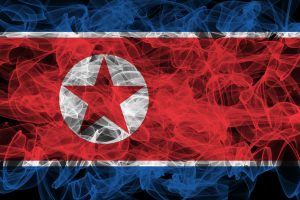North Korea fired an unidentified projectile off its east coast on Wednesday. This unidentified projectile, presumed to be a short-range ballistic missile, flew from Jagang Province in the north of North Korea, according to South Korea’s Joint Chiefs of Staff (JCS). Today’s launch came 78 days after North Korea tested a newly developed submarine-launched ballistic missile and it could be another violation of United Nations Security Council resolutions if the latest projectile is officially confirmed to be a ballistic missile.
South Korea’s JCS has not provided more details on what type of short-range ballistic missile the North tested, including information regarding the range and apogee, saying Seoul and Washington’s analysts are analyzing the data to learn more about this projectile. However, as North Korea’s single missile launches usually indicate the showcase of another advanced missile weapon, experts believe that this could be the Hwasong-8, first test-fired in September and believed to be the North’s first hypersonic missile. Today’s launch was conducted in the area where North Korea launched its hypersonic missile in September. North Korea could have test-fired the Hwasong-8 again as part of its winter military drills.
North Korea previously touted its hypersonic missile test as an achievement of “great strategic significance,” but Seoul’s JCS devaluated the capacity of Hwasong-8 by saying that it appears to be “at an early stage of development” and can be intercepted by South Korean and U.S. military assets.
While attending the groundbreaking ceremony for a railway in Goseong, near the inter-Korean border, South Korean President Moon Jae-in urged North Korea to “make efforts for dialogue” and added “the peace would not come by itself.” He also showed his concerns that the North’s missile launch could raise tensions on the Korean Peninsula.
South Korea’s National Security Council (NSC) also expressed “deep concern” over the missile launch even before the JCS shared details on the missile to the public, implying the latest projectile is highly likely be an advanced short-range ballistic weapon.
Pyongyang has not yet made any statements criticizing Seoul’s official responses to today’s missile launch. Moon and NSC’s comments could reflect what North Korea has previously called a “double standard” on the military activities conducted between the two Koreas. Pyongyang has repeatedly complained about Washington and Seoul’s statements on its missile launches, but most of the North’s launch activities were clearly a violation of U.N. Security Council resolutions.
While reaffirming its commitment to beef up military capability, North Korea has not shared any details on what it discussed regarding policy on nuclear talks and inter-Korean relations during last week’s Plenary Meeting of the ruling Workers’ Party. Given the circumstances, its counter-response to statements from Seoul and Washington regarding the missile launch would show whether nuclear diplomacy is off North Korean leader Kim Jong Un’s agenda for 2022.
“I think it was inappropriate for NSC to express ‘concern’ [over the North’s missile launch] when what the North conducted was not confirmed accurately,” Cheong Seong-chang, the director of the Center for North Korean Studies at the Sejong Institute in South Korea, told The Diplomat. Cheong pointed out that Seoul’s “overreaction” toward North Korean missile launches would bring more resistance from Pyongyang against the South’s missile deployment or development, as it already has powerful missile-capable weapons such as a stealth fighter jet.
“Inter-Korean relations would be more strained if North Korea thinks its demand to withdraw the ‘double standard’ has been disregarded by taking a hard-line stance again,” Cheong said.
































